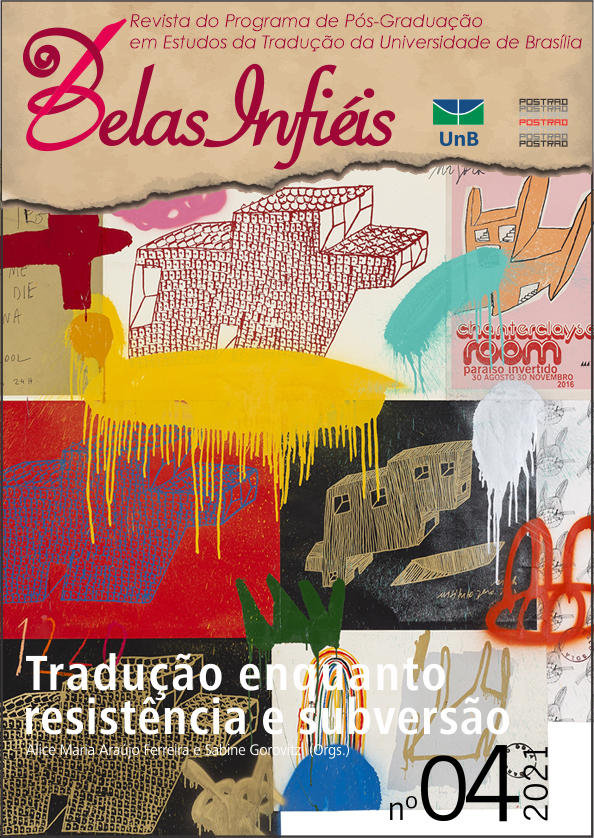Translating is Resisting: Subversion and Atheism as a Device for Internationalization of Brazilian Culture
DOI:
https://doi.org/10.26512/belasinfieis.v10.n4.2021.34136Keywords:
Translation and Resistance. Atheism. Internationalization of Literature. Iracema. Macunaima.Abstract
The resistance, autonomy and subversion of language and literature in Brazil has its roots in the nineteenth century and extends into the twentieth century, which provided a literary nationality, a cultural and literary independence, demarcating itself from the Portuguese language and literature of the metropolis. In the first part of this article, I make a brief historical analysis of the creation of a language (Brazilian Portuguese) within the language (Portuguese of the metropolis) resistance to Portuguese literary impositions from two examples of Brazilian writers, José de Alencar and Mário de Andrade, and their respective novels, Iracema and Macunaíma. And in the second part, I reflect on the place of literary Brazil on the world map of literatures from José Lambert's theory of the multiplication of World Maps and Pascale Casanova's theory on the parameter of Greenwich's Meridian and dominant and dominated literatures as well as the question of the power and domination of languages-cultures. Every argument is made from the perspective of translation as a means of resisting hegemonic power and as a form of cultural atheism.
Downloads
References
Alencar, J. de. (1870). Iracema, (2ª edição). H. Garnier (Postscripto, pp. 241-268).
Alencar, J. de. (1959). Obra Completa. (v. 1). Aguilar.
Berman, A. (2013). A Tradução e a Letra ou o Albergue do Longínquo. (M. H. C. Torres, M. Furlan, & A. Guerini, Trans.). Editora Copiart.
Casanova, P. (2002). A república mundial das letras. (Marina Appenzeller, Trans.). Estação Liberdade.
Casanova, P. (2021). A língua mundial: tradução e dominação. (Marie-Hélène C. Torres, Trans.). EDUFSC/EDUnB.
Campos, H. (1992). Metalinguagem e outras metas. Perspectiva.
Granja, L. (2013). Rio-Paris: primórdios da publicação da Literatura Brasileira chez Garnier. Letras, 23(47), 81-95.
Hallewell, L. (2005). O livro no Brasil. (Maria da Penha Villalobos, Lólio Lourenço de Oliveira, Geraldo Gerson de Souza, Trans.). Edusp/T.A. Queiroz.
Lambert, J. (2011). Em busca dos mapas-múndi das literaturas (Walter Costa, Trans.). In A. Guerini, M. H. C. Torres, & W. Costa (Orgs.). Literatura & Tradução: Textos selecionados de José Lambert, (pp. 17-37). 7Letras.
Torres, M. H. C. (2014). Traduzir o Brasil Literário: história e crítica. PGET/UFSC & Copiart.
Downloads
Published
How to Cite
Issue
Section
License
Copyright (c) 2021 CC BY

This work is licensed under a Creative Commons Attribution 4.0 International License.
Given the public access to this journal, the texts are free to use but requires the recognition of the original authorship and initial publication in this journal to be properly stated.
 The journal allows the use of works published for non-commercial purposes, including the right to submit the work to publicly accessible databases. Published contributions are the sole and exclusive responsibility of the author(s).Â



















